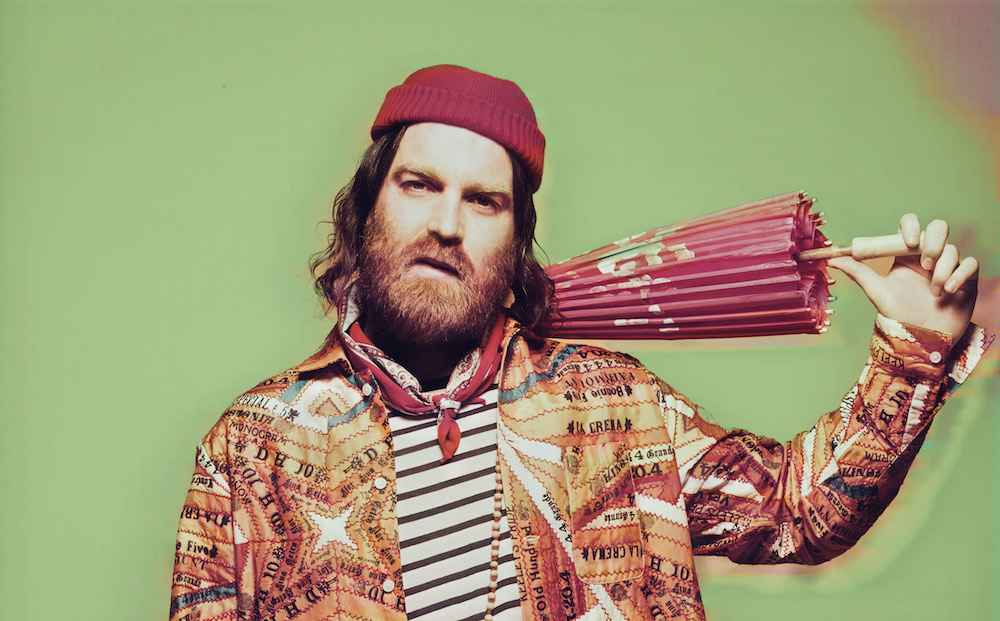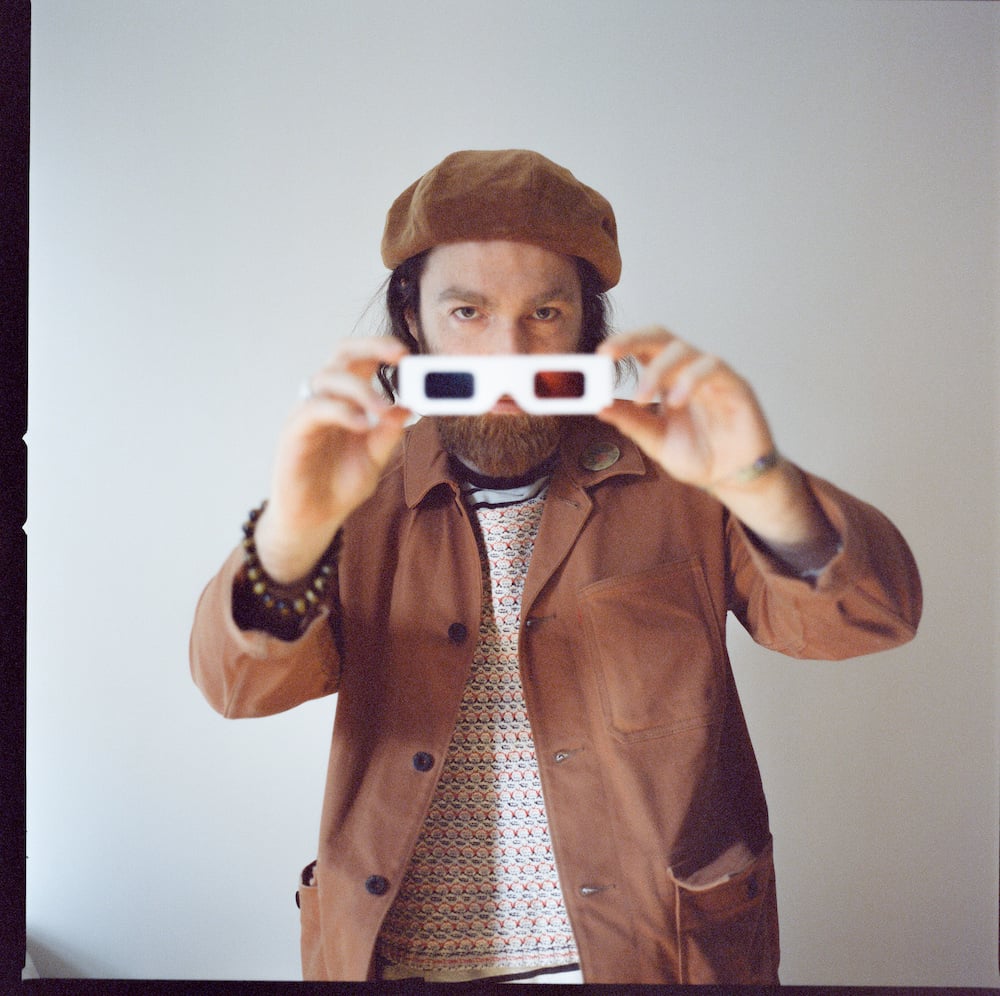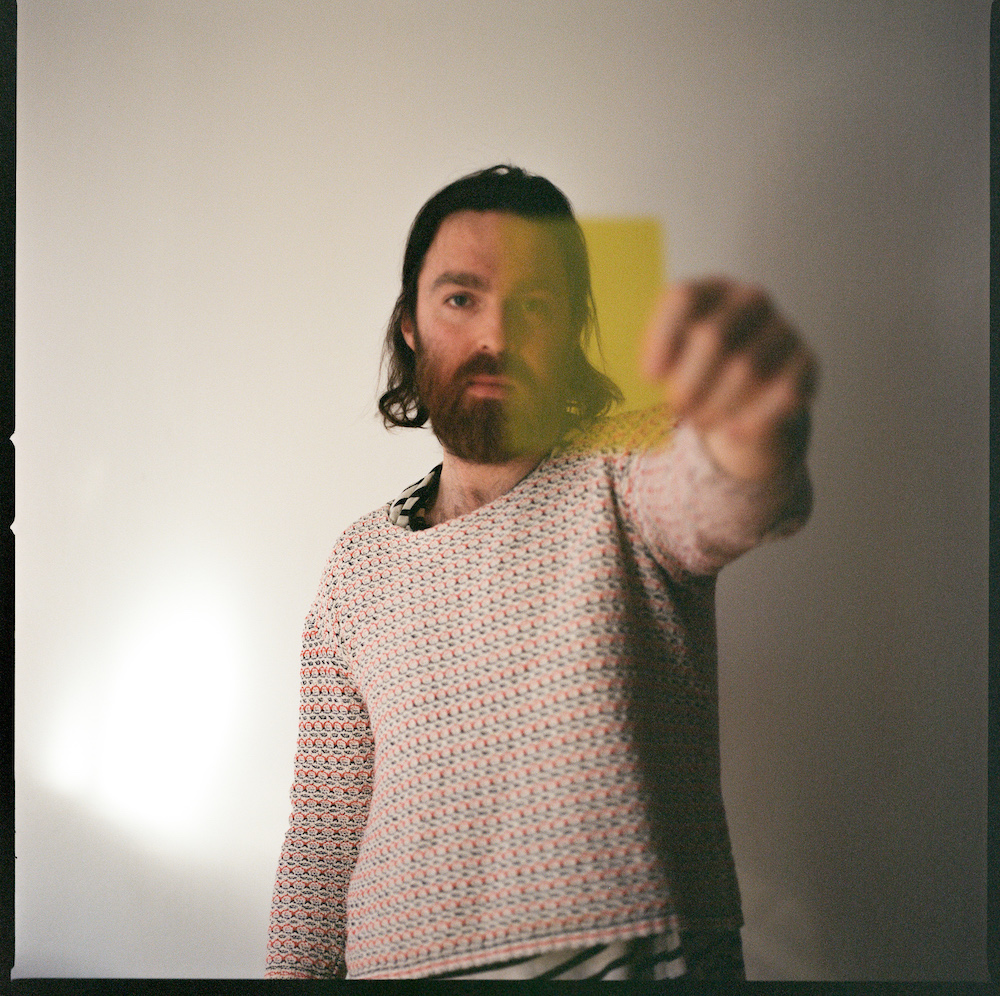Last January, just months before COVID-19 stopped New York in its tracks, Nick Murphy was going every day to his studio in downtown Manhattan. To his genuine surprise, the songs coming out were sounding a lot like the Chet Faker project he’d left behind in 2016.
Murphy moved from Melbourne to New York when Chet Faker’s 2014 debut album Built On Glass was still fresh. For the next half-decade, he searched in vain for an affordable Manhattan studio to call his own. Finally, his manager found a soundproofed room that wouldn’t break the bank. It was tiny and cramped, but it fit the bill. In those pre-pandemic days, Murphy spent countless hours alone between those four walls, playing whatever felt right.
Then came March 2020, the month the earth stood still. In the blink of an eye, the 10-minute commute from his apartment to the studio got awfully quiet. Walking through the deserted streets, Murphy felt like Will Smith in I Am Legend. Eventually, he bought a bike and rode it home each night with his laptop full of new songs. It was eerie, but also liberating for a self-identified introvert.
As COVID numbers soared, Murphy kept showing up to work, maintaining a “kind of weaponised OK-ness when everything was totally fucked.” Despite the gathering storm outside, the artist best known as Chet Faker was making the most hopeful music of his career.
All those days and nights in the studio resulted in a new Chet Faker album, Hotel Surrender. Released last month, its lean 10 tracks pick up where Built On Glass left off — at least in their intimate electronic soul sound. Spiritually, a lot has changed. Last October, Chet Faker’s social media accounts reactivated to reveal comeback single, ‘Low’, which hit #70 in the triple j Hottest 100. Cruisy and quietly strutting, ‘Low’ is a fitting entree into Hotel Surrender, which feels looser and more fleet-footed than what’s come before.
Murphy describes Hotel Surrender as an “accidental” Chet Faker album. A lot of life had to happen to bring him back to where he started.
Learning Surrender
When I connect with Murphy via Zoom, Hotel Surrender has just hit streaming services. He’s sitting in the studio where he made the album, looking relaxed in a white t-shirt and studio headphones. His ginger beard has weathered the pandemic unscathed.
Even on Zoom, I can see the full dimensions of his studio, which can be generously described as broom cupboard-like. A string of Chinese lanterns hangs above shelves cluttered with production gear. Murphy tells me the best stuff, like the MPC drum machine and Kaoss Pad, are just off-screen. He holds up his trusty toy Buddha to complete the picture.
“When COVID hit, it was just like everything else in the world got removed except my apartment and this studio,” he says. “So it just laser beamed what I was already doing.”
“I consider social media inherently insipid and bad for the psyche.”
I’m Murphy’s last commitment in a string of media interviews, but he’s more than happy to talk expansively (idle chit chat, I sense, isn’t his thing). Earlier that day, on a train journey from upstate New York back to the city, he listened to Hotel Surrender in full, enjoying what he created. It’s not always that way.
“I went through the inevitable existential depression that happens when you put something out that you’ve worked on for so long,” he says. “When something is released publicly, I need to get away from that psychic energy. It’s good to have a task to bury your head in while everyone is telling you what they think.”
This self-care routine relies on a healthy disdain for social media. “I consider social media inherently insipid and bad for the psyche,” he says with easy directness. “I try as much as possible, when I can, to break any preconceived notions of grandeur or unattainableness.”
It’s important, he says, to be seen as just as a normal dude. “I don’t want the super nice press shots on a yacht, because no one lives like that.” (Chet Faker press shots over the years have featured beads, beanies, flowers, artfully-placed cigarettes and several searching gazes, but zero yachts.)
The high spirits I’m sensing through Zoom are not a media day front. It’s part of a whole new lease on life that permeates Hotel Surrender. As Murphy sees it, the album is a journey back into the light after years of “always writing as an expression of angst”.

Photo Credit: Press
Hotel Surrender opens with its creator’s spoken voice on ‘Oh Me Oh My’, unfurling a story of someone climbing through a window “into the here and into the now”. Murphy sees the monologue as an evolution from the words that open Built On Glass and Run Fast Sleep Naked, his 2019 album as Nick Murphy. “On Built On Glass, it was like, I’m about to vent,” he laughs. “Check out my misery.”
Run Fast Sleep Naked, meanwhile, begins with his unvarnished voice singing, “I’m not made of stone/I was put here with a bleeding heart/to help somebody else’s start”. As Murphy tells it now, “That was the beginning of me realising there’s a role to making music.”
Murphy thought of the spoken word intro on ‘Oh Me Oh My’ as a mantra or poem. At first, he wanted it to sound like an old cowboy who’d come out of the desert newly enlightened. Kind of like Sam Elliott in The Big Lebowski? “I tried to get him to do it, actually,” he says with glee. “My drummer is friends with Sissy Spacek, who is friends with Sam Elliott. He probably gets a million requests a day to do that voice, so in retrospect, I apologise to Sam.”
Murphy toyed with a Japanese version of the monologue, then asked his uncle back in Australia to try it. No one could get it exactly as he heard it in his head, until the obvious solution dawned on him. “It’s such a classic problem of mine, where I want to say something but I don’t have the confidence to be the one who just says it,” he says. “Of course I got it in the first take.”
Like the mantra suggests, Hotel Surrender captures Murphy’s arrival into a brighter here and now. The journey to get there, though, took some unexpected turns.
Chet to Nick and Back Again
Australia first got acquainted with Chet Faker on his 2012 debut EP, Thinking In Textures. While the EP featured durable originals like ‘Cigarettes and Chocolate’ and ‘I’m Into You’, its standout was a cover of Blackstreet’s ‘90s R&B jam ‘No Diggity’. In this treatment, the song adopted an almost narcotic pace, with Murphy’s voice floating on a soft bed of electronics. Its easy likeability made it a viral success story, hitting #1 on Hype Machine (hello, early 2010s) and turning up everywhere from credible DJ mixes to your local supermarket playlist.
Murphy could’ve easily capitalised on the spotlight with a few more crowd-pleasing covers. Instead, he released the Lockjaw EP alongside his Future Classic labelmate Flume, featuring their breakout hit ‘Drop The Game’ (230 million Spotify plays and counting). All this activity set the hype high for Built On Glass, which led with the singles ‘Talk is Cheap’ and ‘1998’.
Built On Glass made Murphy very busy. After touring Australia directly following the album’s release, the producer spent 2015 making Chet Faker an international name. His song ‘Gold’ was picked up to spruik Apple’s new MacBook, he made his US television debut on Ellen and Coachella came calling. His music really travelled, too: in Istanbul, a relatively intimate show in November 2014 was upgraded to the city’s much huger Volkswagen Arena. The guy with the beanie and beard was suddenly everywhere.

Photo Credit: Nick Murphy
Murphy’s move to New York at peak stardom made practical sense, but he had personal reasons too. “I’m a total introvert,” he explains. “I’m so fucking sensitive to people’s energies, it really stresses me out. Sometimes I have to just leave the room; it’s borderline debilitating. It’s actually one of the reasons I moved to New York, because I thought this place would force me to overcome that. And it has definitely helped.”
Which isn’t to say he’s seeking out parties. “I have a lot of fun with myself,” he laughs. “I can go six to eight months on my own.” To illustrate his point, he tells me about his recurring private joke with an exit sign that hangs in his apartment. “I’ll say out loud, ‘Oh, is that the exit?’ And make myself laugh. It’s a bit crazy.”
In 2016, Murphy announced that he was retiring Chet Faker to record under his real name. At the time, he described Chet Faker as a distinct project that had somehow become his whole identity. “There’s an evolution happening and I wanted to let you know where it’s going,” he wrote on Twitter.
This evolution kicked off with the swelling, Bonobo-esque sound of ‘Fear Less’ and ‘Stop Me (Stop You)’. (Murphy went on to feature on Bonobo’s 2017 album, Migration.) On his debut Nick Murphy EP, Missing Link, the producer hooked up with Kaytranada and submerged his voice under layers of electronics. Run Fast Sleep Naked pushed further into this new sonic territory, even if some fans wished for a return to the hooky Chet Faker sound.
“I’ll say out loud, ‘Oh, is that the exit?’ And make myself laugh. It’s a bit crazy.”
The Nick Murphy era continued into 2020 with Music for Silence, an instrumental album recorded in an old church in upstate New York “with pigeons in the rafters”. The album was so far from Spotify hit-chasing that it debuted on the meditation app Calm.
“In the middle of the church was a piano with a bunch of microphones pointing at it, and I just played all day, for five days straight,” Murphy recalls. “It was fully improvised. With a gun to my head, I couldn’t play one of those songs. Music For Silence was the first time I let the music unfold naturally, and not bought some preconceived notion of what I ought to make. It was almost like my body made the music.”
Murphy describes his instrumental album as the “wet clay” for Hotel Surrender. “There is no Hotel Surrender without Music For Silence,” he says. Without elaborating on the specifics, Murphy says that Music For Silence came from a “place of deep sadness”. His new music as Chet Faker is similarly heartfelt, but from a place of joy.
On our Zoom, Murphy swings around to his keyboard. “One day, I just came into the studio and was like…” He begins playing a bright, funky piece on the keys. “In the past, I would’ve said, ‘Nah, that’s cheesy, leave it alone.’ But once I accepted this idea that music wants to be what it wants to be, that’s where this record started.”
After those years of searching, Nick Murphy had found his way back to Chet Faker.
Where Do We Go From Here
Murphy’s new flow in the studio extended to how he used his voice. After the accessible charm of Built On Glass, the Nick Murphy years got a bit headier. “With the Nick Murphy stuff, I was really launching, trying to hit these high notes,” he says. “Then on Music For Silence, I didn’t even want to sing.”
On the songs that came together as Hotel Surrender, he wanted to “cut out the muck and density” and just let it rip. “On this one, it was just me up close with the mic, like…” He lets out a guttural warble, then grins. ”Any time I thought something wasn’t cool enough, I went in that direction more.”
This singing from the heart partly sprang from “coming back to the styles of music that I love, which is predominantly Black music.” On his “exploration to whittle down the elements” as Nick Murphy, he’d stepped away from his core influences of soul, funk and rhythm & blues. In our conversation, Murphy keeps circling back to two inspirations: funk superheroes Sly & The Family Stone and British glam-rock trailblazers T-Rex.
“Sly & The Family Stone and T-Rex didn’t have heaps of instruments,” Murphy says. “They were playing with a set amount of toys.” The production on the album was dictated by what could fit in his miniature studio. “I have lots of pedals, but one of everything else,” he says. “I only had one piano, one synth, one electric guitar and one bass guitar. There’s no excess.”

Photo Credit: Nick Murphy
In May 2020, with COVID numbers skyrocketing in New York, Murphy received news from Australia that his father had died from a sudden heart attack. Because of travel restrictions, Murphy couldn’t make it back to Melbourne for the funeral. He’s still waiting for the right time. While solitude comes easily to him, he doesn’t think he could do a 14-day quarantine.
“I try to call my brother every day, but he’s really busy with his job,” he says. “And I call my Mum every day. I’m pretty sure I annoy my family at this point.” How did he navigate grieving from so far away? “Music helped,” he says simply. “Having something to work on.”
For Murphy, his father’s death refocused the transformation he was already going through. “Since Dad passed away, it’s like, life is so short,” he says. “The record was more or less finished when my Dad passed away. But the one thing that did was aggressively galvanise this thing that I was beginning to understand, which is that music is just music. It’s not a plight or a crusade, yet at the same time it’s a beautifully sacred process.”
Murphy pauses, then the words flow out. “Music is both nothing and everything all at once. What happened with me looking at mortality was I realised that my job is to give people music. It’s not for me to use music for my own personal whatever. Sometimes I’ll need to it to do that, and maybe that’s what the Nick Murphy stuff is about.”
“Music is both nothing and everything all at once. What happened with me looking at mortality was I realised that my job is to give people music.”
“When my Dad died, I was so grateful for music,” he continues. “And I don’t know if I’d ever been grateful for music. I just couldn’t believe that this thing existed, and how lucky I was to be able to commune with it. Life can be so painful, and why on earth would I choose to engage with darkness if I didn’t need to? Darkness is inherent and inevitable in existence, and what’s much more fleeting is joy.”
I ask Murphy if the joy he’s been able to channel on Hotel Surrender has anything to do with getting older and finding comfort in his own skin. After all, he’s 33 now, which is a long way from the 20-something guy who made Built On Glass. “I would put it differently,” he says. “I think it’s getting older and getting sick of myself. Or this idea of myself. I’m so sick of my bullshit.”
I end our call by asking what he does for release beyond the studio, as I can’t quite picture it. He likes dancing, but misses the house and techno scene in Melbourne. “My lust for the nightlife is definitely diminished. The chaos is less enticing to me.” As New York blooms again after its COVID nightmare, it’s more likely you’ll find Nick Murphy in a park, picking flowers or taking photos of bird life.
“In the past, I’d want to stop and take a photo of a bird, but a voice would tell me that people would think that was weird,” he says. “Now I’m like, ‘Well, now you fucking have to do it, buddy!’ You can’t be a hard ass out in the world, then expect to come into the studio as an inner child full of wonderment and joy.”
Murphy is past caring if channelling your inner child sounds cheesy. “People I love are going to die, I’m going to die, horrible things are going to happen, but the light is there,” he says firmly. “My North Star was tortured artist, and I switched that out for inner child. I imagine that might be my North Star for the rest of my life.”
With that, we’re done, and Nick Murphy’s little studio is all his own again.
Jack Tregoning is a Sydney-based music and culture writer for Billboard, the Recording Academy/GRAMMYs and Red Bull Music.
Photo Credit: Jelani Roberts



